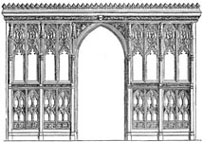
Is There Such a Thing as “Mere Christianity”?
BY WHAT AUTHORITY DOES C.S. LEWIS PONTIFICATE?
The great Anglican apologist and scholar C.S. Lewis (1898-1963) championed a concept he called “mere Christianity.” Although the term itself seems to have been coined by the Puritan divine, Richard Baxter (1615-1691), in Lewis’s mind it meant what he regarded as those central truths which were held by all Christians:
The reader should be warned that I offer no help to anyone who is hesitating between two Christian “denominations.” You will not learn from me whether you ought to become an Anglican, a Methodist, a Presbyterian, or a Roman Catholic. This omission is intentional (even in the list I have just given the order is alphabetical)…. Ever since I became a Christian I have thought that the best, perhaps the only, service I could do for my unbelieving neighbours was to explain and defend the belief that has been common to nearly all Christians at all times.
This quotation comes from Mere Christianity, the chief book in which Lewis undertook to justify and expound those elements of the Christian faith which he supposed were common to all Christians. The concept of “mere Christianity” is popular among many Christians, even Catholics, and sometimes seems to function as a kind of ecumenism for conservative Christians.
In this article I will argue that the notion of “mere Christianity” is one that an orthodox Catholic cannot entertain, because implicit in it is a denial of the supreme importance of the Catholic faith as the complete revelation of God, together with a corresponding tendency to consider the Catholic Church as simply one among the many “denominations” of Christianity. And as we will see, there are many other conceptual and factual problems with the idea of “mere Christianity.”
You May Also Enjoy
A revealing vignette about the priorities of the Episcopal Church...
Any full-time Church of England clergyman who worked for at least five years prior to 1992 was entitled to compensation if he resigned over women's ordination.
Being an Anglican was like living with a woman out of wedlock: It had the advantages of marriage with none of the commitment and discipline.

